Sometimes I can’t explain what I like about Reign. I can tell you all the things I don’t like easily enough. And a lot of those are the essential lessons in what not to do in our storytelling. And yet, even with its flaws there’s a lot I enjoy about it. I enjoy most of the characters and a majority of the actors. I love a lot of the themes they explore. And I love the history of it all, especially the parts where they’re inaccurate.
That’s right. Our first lesson is sometimes it’s great to get it wrong.
(p.s. spoilers abound throughout this post – you’ve been forewarned)
Don’t (always) Tell the Truth
There’s an entire genre of alternate history, because we love looking at the past and at the same time, we want to fix it. We have the benefit of hindsight and still, sometimes, we wonder what would the world look like if…
Reign doesn’t play with alternate history but they also don’t hold themselves slavishly to the truth, which is part of what makes the show appealing. Because we all know what happened. We don’t want a recreation of a wikipedia article on the life and marriages of Mary, Queen of Scots.
We want a handsome prince, first of all. We want passion and danger, court politics and subterfuge. We want an intriguing and terrifying Catherine de’ Midici. We want the depth and the emotion and the details and sometimes that’s a lot more interesting when it’s not entirely accurate.
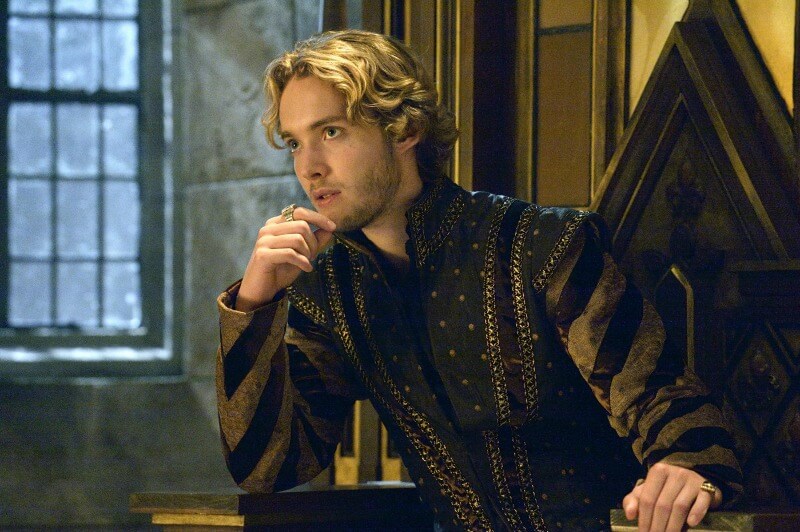
Even, sometimes, we want a happy ending no matter what the history books say. If you don’t believe me, read My Lady Jane and tell me you’d rather they were unrelentingly accurate instead.
Sometimes, it’s important to tell the truth about our history. The choices people made, the mistakes and victories can teach us who to be in our own life and how to make good choices. Sometimes, though, it’s good to have fun with history. To tell the story the way we wish it had gone. And sometimes we can learn from those changes as well.
Casting Matters (even in novels)
How you describe your characters matters. It’s superficial but it’s true. If you want the audience to like someone called Bothwell who historically was probably pretty dastardly, the first thing you do is cast Adam Croadswell and you’re halfway there. Not just because he’s handsome but because he brings a certain level of integrity and genuineness to his characters. Even when the circumstances tell the audience they shouldn’t trust him, they can’t help liking him, wanting to trust him, wanting him to be a good guy in the end (see also Once Upon a Time).
The same with James (Dan Jeannotte) who you want to like and trust, no matter how much they set it up to look like he’s betraying Mary.
And even Luc (Steve Lund) who, no matter how much you’re invested in Claude and Leith, you want to end up with a happy ending (and really he deserved so much better than Claude).
Want the audience to automatically dislike someone? Cast Jonathan Goad and give him greasy hair and they definitely won’t trust him. No matter how many nice things he says (and he doesn’t really say anything nice in Reign).
Playing with these contradictions can make your characters more interesting – the unattractive person with great character; who you can’t help but love. Or the attractive person with terrible character you despise (which is the more common (dare I say overused) contradiction).
Even though Francis was historically short, unattractive and sickly, casting Toby Regbo makes him dynamic, torn, powerful… interesting. He’s suddenly a character that pulls us into the story and pairing him with Adelaide Kane worked brilliantly. Because if we’re going to follow someone through a series, they need to capture our affection as well as our attention. For the series to work, for it to be interesting at a new level, Mary had to be beautiful enough that all the men of history wanted her for more than her crown. She had to be fierce and fun to survive at court and to be someone the audience wanted to walk through each episode with. She had to learn from Catherine de’ Midici (wonderfully played by Megan Follows) to be more clever than they expected; to be ruthless because it creates dimension as the story goes on.
It can also work against you if you’re not careful. Playing with contradictions, when it doesn’t work, makes the audience dislike someone you want (or need them to) enjoy (like Blackburn). It can even make them despise the character when they don’t like them but the story keeps insisting that they’re supposed to, because can’t you see that everyone else does (like Claude and also like Blackburn). But if the audience doesn’t believe that they’re worth liking, it’s going to backfire on you.
The question isn’t just, ‘do I want the audience to like them’ but also, ‘what do I need the audience to feel in order for this character to serve the story.’ Again, Gideon Blackburn (Ben Geurends) was incredibly poorly cast, not because he’s unattractive but because the writers asked too much of the audience by casting him in that role. For him to serve his purpose, after Conde (Sean Teale) and Francis, he needed to be more than mildly adorable or slightly pathetic (they totally milked the whole ‘I’ve been so mistreated’ angle to engender affection). He needed to be someone the audience believed could capture the heart of not one but two queens.
Casting can make or break a tv show or a movie. It’s a bit less influential in books since everyone will imagine their own version of what you describe but it’s still a tool you can use to gain the audience’s favor and trust or set up a character to fail.
You Don’t Need Sex
Sex is an interesting thing. We’re creatures of passion so desire, not getting what we want, betrayal and conflicting loyalties all have the potential to create interesting conflicts. But you can use sex without being gratuitous. You can also use sex to be lazy. Need to fill up 5-10 minutes without having to write actual dialog or plot points? Throw in a sex scene. It weakens your story but it fills it out (action can be used to the same end).
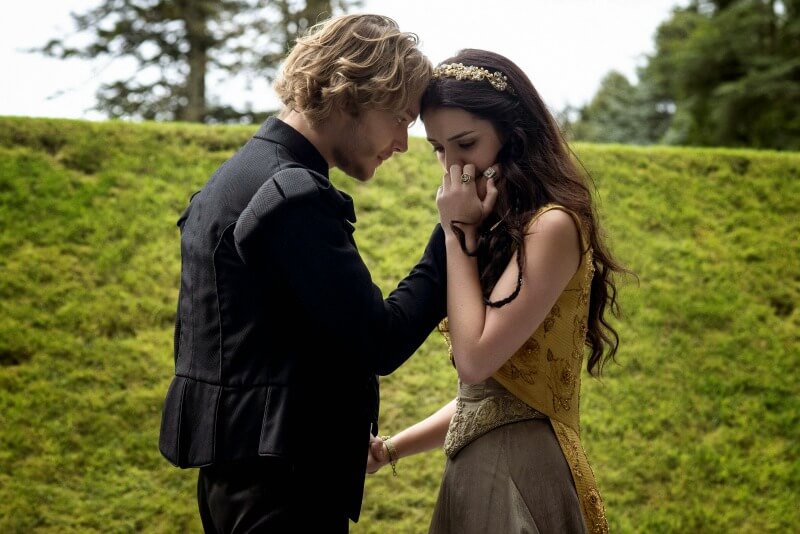
Don’t turn this lesson into a way to easily bulk up your word count! It’s the exact opposite. The lesson is that the audience can tell when you’re filling gaps with empty scenes. Or when you’re being gratuitous because it’s easier than being creative.
I don’t know if the network wanted it. Or the creators thought it would be interesting. Or maybe there’s just this expectation that this sort of historical drama is full of sex. But Reign didn’t need it. The characters were more than interesting enough without it.
Try it – fast forward through all the sex scenes and see if you’re missing any part of the plot.
Perils of Pacing
Oh pacing! It’s obviously easier when you know how many books you’re going to get to write or how many episodes you’ll have. You can plan. You can be intentional. But one of the most valuable lessons from any tv show is that you never know what the future holds.
Tell your best story now.
The worst thing you can do is draw out a story with filler to get to where you really want to be (this is also the Lost lesson, but we’re discussing Reign today).
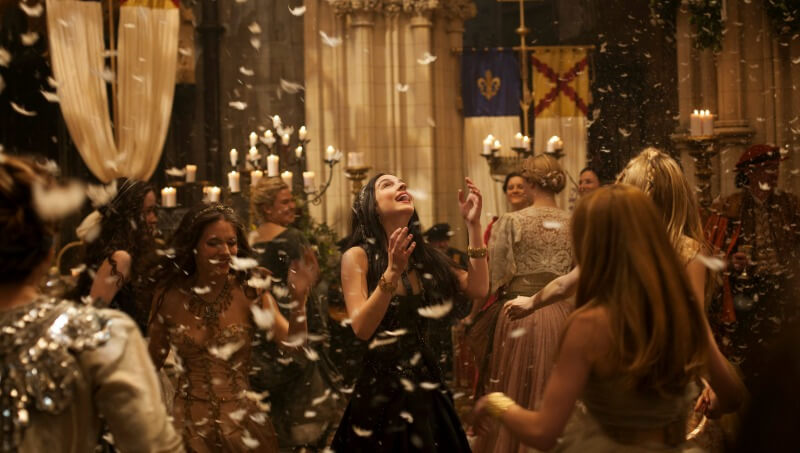
From s3 on, Reign is just a mess. I have the benefit of hindsight, but it’s not that hard to apply the lesson without it. There were far too many episodes in season 3 waiting for Mary to go Scotland. She’d been talking about it for years. With Francis’ death and once Charles was crowned there was no reason for her to wait around. She should have left no later than the season mid-point. Probably they didn’t because they didn’t want to break up their dynamic duo of Megan Follows and Adelaide Kane and I get that. But it was going to happen eventually and dragging it out hurt.
That way, you touch upon all three of her marriages, you get her abdicating to James, and you get a more fluid move to the end. Instead of the things moving soooo sllowwelllly and then all of the sudden 21 years later she dies.
Because the other problem with empty filler is that far too often it leads to an abrupt ending.
So get to your best plot point. Set up then execute that conflict you’re dying to tell. Make the story happen now because the more you do that, the better you’ll get at creating the most interesting parts of your story.
Plot vs Conflict
Which leads to plot vs conflict. A lot of people will say that plot is what happens (the beats and the moments) in your story. I am going to dare to disagree. I think plot is the overall scope of what happens in a story – it’s the holistic picture and not just an occurrence, or a series of occurrences.
Conflict is more than when things go wrong for the characters – it’s the occurrences, the hard moments and hard decisions and places where they disagree and things they must overcome. TV is full of conflict because that’s what the writers do day in and day out – another episode, another set of occurrences to move characters around.
The problem is a lot of tv writers get stuck in conflict, focusing on what they need for this episode without a good view to plot (this is also the source of a lot of contrived conflict).
Basically, after Francis’ death it became a mess of creating conflict without any sense of an overall plot and a vat of unfinished storylines:
So, taking the previous lesson into account, when you set up a storyline, carry it through. Write your best conflict now then in editing step back and make sure each of the individual pieces serve the larger plot. You’ll end up with more cohesive, dynamic stories and your readers won’t be left wanting.
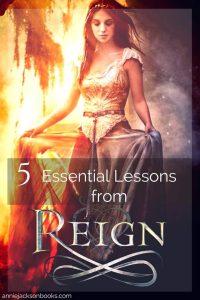
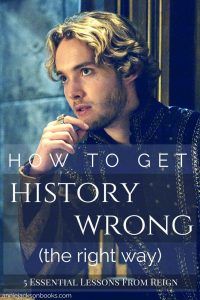
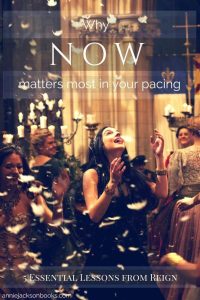
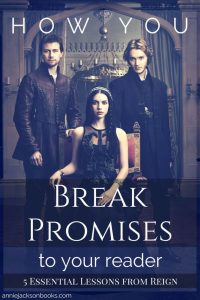


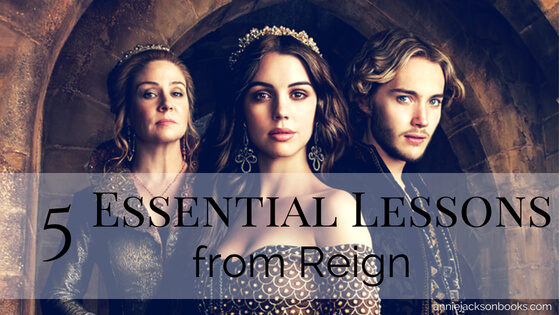
Follows….It is Megan Follows not Fellows
thank you – I looked her up like a dozen times on imdb and I STILL got it wrong!
I love seeing fellow Reign fans in the writing world. Keep these articles up! I love them.
Thanks!! I’ve definitely got a few more shows to write about 🙂